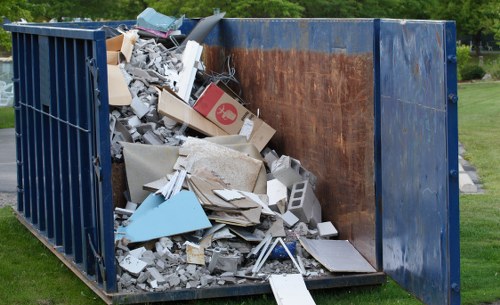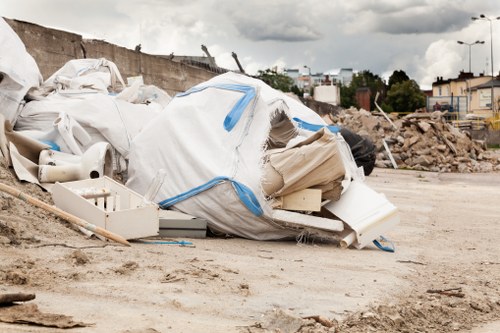Effective Construction Waste Disposal in Eltham: A Comprehensive Guide

Introduction to Construction Waste Disposal
Construction projects in Eltham generate a significant amount of waste, making effective disposal strategies essential for environmental sustainability and community well-being. Proper management of construction waste not only helps in reducing landfill usage but also promotes recycling and resource conservation.
Understanding the types of construction waste and the best disposal methods is crucial for contractors, homeowners, and businesses involved in construction activities. This guide explores various aspects of construction waste disposal in Eltham, providing actionable insights and solutions.
Why Proper Waste Disposal Matters

Types of Construction Waste
Construction waste encompasses a wide range of materials generated during building, renovation, and demolition projects. Common types include:
- Concrete and Masonry: Includes broken bricks, concrete blocks, and other masonry materials.
- Wood and Timber: Scrap wood from framing, flooring, and other structural elements.
- Metals: Steel beams, aluminum siding, and other metal components.
- Plastics and Composites: Insulation materials, pipes, and other plastic-based products.
- Drywall and Plaster: Excess drywall sheets and plaster waste.
- Hazardous Materials: Paints, solvents, and other chemicals that require special handling.
Identifying the types of waste helps in selecting appropriate disposal methods and recycling options.
Eltham's commitment to sustainable construction practices is evident through various waste management initiatives.

Regulations and Guidelines
Eltham, like many regions, has specific regulations governing construction waste disposal to ensure environmental protection and public health. Key regulations include:
- Waste Classification: Differentiating between recyclable, non-recyclable, and hazardous waste.
- Disposal Permits: Obtaining necessary permits for waste transportation and disposal.
- Recycling Requirements: Mandates on the percentage of waste that must be recycled.
- Reporting and Documentation: Keeping accurate records of waste generation and disposal activities.
Compliance with these regulations not only avoids legal penalties but also contributes to Eltham's sustainability goals.
Staying Informed

Construction Waste Disposal Methods
Recycling and Reuse
Recycling construction waste involves processing materials to create new products, reducing the need for raw material extraction. Commonly recycled materials in Eltham include:
- Concrete and asphalt
- Metals
- Wood
- Plastics
Reuse involves repurposing materials for new construction projects, such as using reclaimed wood for interior finishes or salvaging bricks for landscaping.
Landfilling
Landfilling remains a common disposal method for non-recyclable and non-reusable waste. However, it should be minimized due to environmental concerns. Selecting a certified landfill in Eltham ensures that waste is managed properly.
Composting
Organic construction waste, like wood scraps and certain insulation materials, can be composted. This method converts waste into useful compost, beneficial for landscaping and soil improvement.
Implementing multiple disposal methods can significantly reduce the environmental impact of construction activities.

Choosing the Right Disposal Service
Selecting a reliable construction waste disposal service in Eltham is essential for efficient and compliant waste management. Consider the following factors:
- Reputation and Experience: Opt for services with proven track records in handling construction waste.
- Compliance with Regulations: Ensure the service adheres to local waste disposal laws and guidelines.
- Recycling Capabilities: Choose providers that prioritize recycling and sustainable practices.
- Cost-Effectiveness: Compare pricing to find a service that offers value without compromising quality.
- Flexibility and Reliability: Look for services that can accommodate your project’s specific needs and timelines.
Partnering with the right disposal service can streamline your waste management process and support Eltham’s environmental objectives.
Making Informed Decisions
Benefits of Proper Waste Disposal
Implementing effective construction waste disposal practices offers numerous benefits:
- Environmental Protection: Reduces landfill usage and lowers the ecological footprint.
- Cost Savings: Minimizes disposal costs through recycling and efficient waste management.
- Regulatory Compliance: Avoids fines and legal issues by adhering to local laws.
- Community Health: Prevents pollution and promotes a healthier living environment.
- Resource Conservation: Preserves natural resources by reusing and recycling materials.
Embracing sustainable waste disposal practices aligns with broader environmental goals and enhances the reputation of construction projects.
Investing in proper waste disposal is a win-win for businesses and the community.
Innovative Technologies in Waste Disposal
Advanced Recycling Techniques
Modern recycling technologies enable more efficient processing of construction waste. Techniques such as automated sorting, material recovery facilities, and high-capacity shredders enhance recycling capabilities.
Waste-to-Energy Solutions
Waste-to-energy technologies convert non-recyclable construction waste into usable energy, providing a sustainable alternative to traditional disposal methods.
Digital Waste Management Systems
Digital platforms and software streamline waste tracking, reporting, and management, ensuring transparency and accountability in disposal processes.
Embracing innovation can significantly improve waste disposal outcomes in Eltham.
Tips for Minimizing Construction Waste
Proactively reducing construction waste not only lowers disposal costs but also contributes to environmental sustainability. Here are some effective strategies:
- Accurate Planning and Estimation: Minimize excess materials by precise project planning.
- Material Optimization: Use materials efficiently and opt for designs that reduce waste generation.
- Reuse and Salvage: Incorporate reusable materials and salvage elements from existing structures.
- Training and Awareness: Educate construction teams on best practices for waste reduction.
- Regular Audits: Conduct waste audits to identify areas for improvement.
Implementing these tips can lead to significant reductions in construction waste.
Sustainability and Future Trends
Green Building Practices
The rise of green building emphasizes sustainable materials and waste reduction. Incorporating eco-friendly practices ensures that construction projects contribute positively to the environment.
Circular Economy in Construction
The circular economy model focuses on recycling and reusing materials, minimizing waste, and creating closed-loop systems in construction processes.
Innovations in Sustainable Materials
Developments in sustainable materials, such as biodegradable composites and recycled content products, are transforming construction waste disposal.
The future of construction waste disposal in Eltham lies in sustainability and innovative practices.
Conclusion
Effective construction waste disposal in Eltham is vital for environmental sustainability, cost efficiency, and regulatory compliance. By understanding the types of waste, adhering to local regulations, choosing the right disposal services, and embracing innovative technologies, stakeholders can significantly reduce the impact of construction activities.
Commit to sustainable waste management practices today to build a greener tomorrow in Eltham.
Contact us today to learn more about our construction waste disposal services and how we can help your project achieve its sustainability goals.